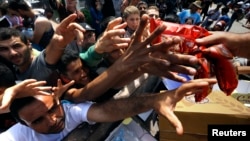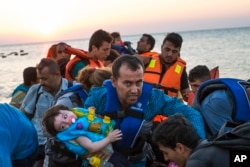Michel Allatuain waited beneath the 14th century fortress at the port of this Greek island on Thursday, desperate for a ferry ticket to the European mainland and a better life.
The 30-year-old pharmaceutical firm employee from Aleppo, Syria, has been sleeping rough in Kos since he paid 2,000 euros to cross from the Turkish coastal city of Bodrum last week. He is among thousands escaping Syria through Turkey and sailing in crowded dinghies to Greece's Mediterranean islands.
The Turkey-Greece route has resurfaced these summer months as a thriving business for smugglers profiting from the stream of people fleeing war and poverty. One example: traffickers in Turkey are getting help shepherding growing numbers of Syrians to Greece, thanks to Syrian accomplices, migrants say.
The influx - 140,000 this year including 50,000 in July alone according to the International Rescue Committee, mainly from Syria - is overwhelming a nation in economic crisis.
In Kos, within sight of Turkish shores, officials estimate there are 7,000 migrants out of a population, excluding tourists, of around 30,000.
Scuffles broke out earlier this week in the Kos sports stadium, where police have forced many of the migrants to camp out while they wait to be officially registered with Greek authorities. The crowds, including many infants, waited with little food and water under a scorching sun.
When clashes erupted on Tuesday, police used fire extinguishing spray to disperse people. On Thursday, young men tried to jump over the walls of the stadium to escape. Outside the arena, hundreds more lay on the ground sleeping.
Doctors Without Borders said on Thursday that 1,500 people had left the stadium after showing their passports and being fingerprinted. Yet 150 more had arrived by Thursday morning, as boatloads kept reaching the island. The aid agency said it had treated 30 people for heat exhaustion and crush injuries.
"I feel that the police hate us," said Rashad Mehli, nursing his wrist, which he said had been hurt in a scuffle with police. "We don't want to stay in Greece and we understand the economic situation here ... but we don't feel respected."
The Greek government, unprepared for the sudden spike in arrivals in Kos, said it was sending a ship with a capacity of at least 2,500 people to the island. The vessel arrived on Friday and could be used to house migrants.
Though many aid organizations are volunteering to provide shelter for the migrants, Kos is experiencing the kind of flare-ups among migrants, authorities and residents that have already been seen in Lampedusa and other Italian islands that have borne the brunt of migrant arrivals.
Around 102,000 migrants have reached Italy so far this year, the majority arriving on boats from Libya, according to Italy's interior ministry. As local authorities struggle to shelter and register them quickly, Italy's government has come under pressure to act faster.
Bishop Nunzio Galantino, head of the Roman Catholic Italian Bishops' Conference, criticized the government for not doing enough to assimilate the migrants. Right-wing parties want the government to repatriate most of the newcomers immediately.
Tourism at Risk
In Greece, the influx of migrants risks hurting a tourist season that has been holding up well, despite the country's economic crisis.
Donna Ellis, a 50-year-old English tourist who has been coming to Kos for the last five years and owns a house on the island, says she wasn't expecting such an influx of migrants.
"I am not particularly frightened, but it's a worrying situation," she says. "You cannot have people camping out like this any more. It's unhygienic, it's dangerous, there are women and children."
Giannis Kouretsis, owner of a vehicle rental agency in Kos, says his reservations are down by 40 percent on last year. Many visitors have cancelled over the past few days after hearing about tensions in the stadium and seeing pictures of makeshift camps around historical attractions.
"How can people go and enjoy a meal in the restaurants with thousands of people camping around them?' Kos Mayor Giorgos Kyritsis said in an interview.
Kyritsis said it would cost six euros a day to feed each migrant on the island. Even by feeding half of the 7,000 he estimates are on Kos, it would cost more than half a million euros for the month.
"We don't have that money. And if you extend this to the whole country, you realize that Greece can't afford to provide nutrition to all these people."
New Routes
The Syrian refugee crisis has been spilling into the Mediterranean for years. In 2014, many Syrians were still reaching Europe through north Africa and across the Mediterranean to Italy. Syrians who could afford it would fly into Tripoli, the Libyan capital, and then cross to Sicily.
Over the past year, however, arrivals of Syrians into Italy have dried up, partly because of reports of attacks by Islamic State militias. At the same time, Turkish traffickers have proliferated.
Many migrants arriving on Greece's islands said they had been recruited by fellow Syrians who were working with Turkish traffickers to organize trips.
Allatuain said he had led a comfortable life in Aleppo, earning 2,000 euros a month before Syria's war began in 2011. As fighting escalated, his salary gradually dropped to 300 euros.
"Also, I was living in fear; I had to leave," he said.
Allatuain said he had traveled to Damascus and easily crossed into Turkey with his passport. He made his way to Bodrum in Turkey's southwest, where he paid a smuggler 2,000 euros to embark on a fast boat to Greece. Along the way, Arabic speakers helped Turkish smugglers in Izmir.
"The masterminds are Turkish, but a lot of Syrians are working with them," he said. "They speak our language so [the traffickers] feel we can trust them."
He had to wait several days before crossing, however, while the smuggler trained one of the Syrian passengers to navigate the boat. They then set sail and "were on our own."







